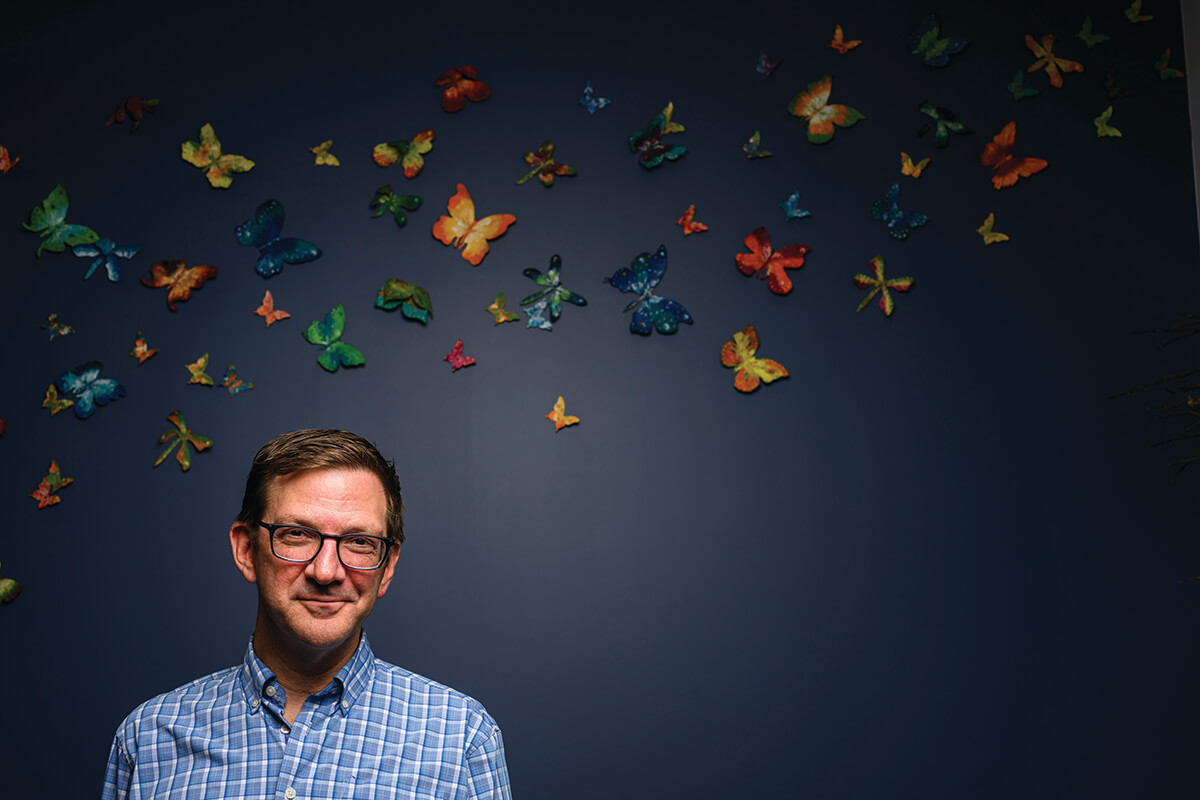GameChangers
Adam Rosenberg Works to Break the Cycle of Child Abuse and Domestic Violence
The Jill Fox Center for Hope, where Rosenberg serves as executive director, includes comprehensive support services for child abuse, domestic violence, and community violence, as well as elder justice for survivors, caregivers, and communities.

Adam Rosenberg first came to Baltimore to interview as a law clerk for the city state’s attorney’s office. Although he set his sights on working in narcotics, the job on offer was in sex offenses. (At the time, the city was on the forefront of child abuse advocacy with its own specific sex offense unit in the police department and one of the country’s first child advocacy centers.) After nearly a decade working as a prosecutor and trying cases on everything from internet crimes to church sexual abuse, Rosenberg applied his expertise to the nonprofit world, becoming executive director of the Baltimore Child Abuse Center in 2008.
In January 2019, the center joined forces with LifeBridge Health to become The Jill Fox Center for Hope, where Rosenberg, 53, is executive director and also acts as vice president for Violence Prevention & Intervention. The Center for Hope includes comprehensive support services for child abuse, domestic violence, and community violence as well as elder justice for survivors, caregivers, and communities. To date, the center serves more than 5,000 clients a year.
Why did you want to be a prosecutor?
At Cardozo School of Law, Barry Scheck [part of O.J. Simpson’s defense “Dream Team”] was one of my professors. I was involved in the criminal law clinic at Cardozo. Prosecution, law and order—not the show—just resonated with me the most. This is tough stuff.
What appealed to you about this type of work?
When I started working at the Baltimore Child Abuse Center, I loved the notion of being able to use the law not just to help people help themselves but also to get back to well again. We’re giving them a path forward that someone is going to fight for them.
Talk to me about some of your day-to-day work and how you view your role.
Part of my job is shouldering the burden of how we intervene in violence. I meet with stakeholders, I try to meet with politicians and thought leaders, I talk about it. I’ve made it a point to make sure we have these discussions about children who have been impacted by violence. Just like we’ve done with cancer and AIDS—we have to talk about it. We have to be able to do the same thing when it comes to domestic violence and child abuse and take action—that’s a real part of my role here, to make sure this remains a part of people’s consciousness and that they are aware of The Center for Hope and how they can help break the cycle of violence.
What are you proudest of in terms of your accomplishments?
I am proud of having been part of a team to pass significant laws, including the Child Victims Act [of 2023], which eliminated the lookback window [a set period when a victim of abuse can file a claim] and enabled survivors to get civil and criminal justice for past abuse. I am proud of the fact that we’ve raised awareness of violence and have a building to support it and [a partnership] with a health system dedicated to it.
Is there something that we, as ordinary citizens, can do to break the cycle of abuse?
We have a responsibility to protect children and to keep children safe from harm and abuse—it’s not a child’s responsibility to protect themselves nor is it their responsibility to report their own abuse. When we look at catastrophic failures of society in protecting children from the Boy Scouts to the Archdiocese to private schools—it’s up to the adults who should have done a better job at protecting the kids.
What we have made a pillar of our work is being sure that adults know that not only do they have a responsibility to do this, but that they must report it if they have reason to believe it occurred. Also, most importantly, these organizations have a responsibility to know how to keep those kids safe, to have the right policies, the right procedures, the right training in place so that we prevent abuse from happening at all.
Was there something in your upbringing that fortified you to do this kind of work?
I was brought up in a good healthy Jewish Reform household, there was summer camp and temple—these are the root of who I am. And, frankly, it goes back to what Rabbi Hillel said, “If I am not for myself, who will be for me? If I am only for myself, what am I? And if not now, when?”